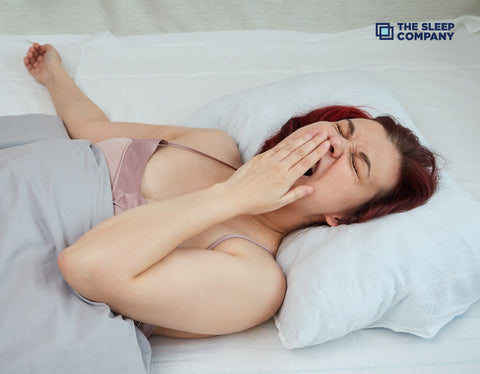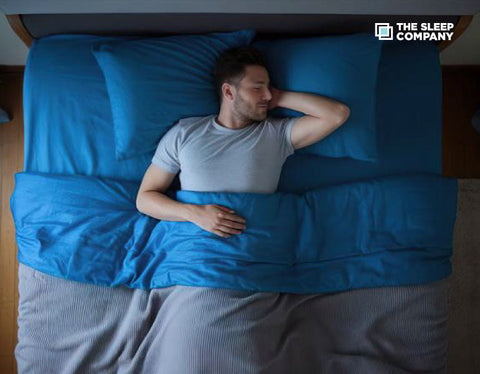My Cart

Can Oversleeping Make You Tired?


Oversleeping may result in excessive daytime sleepiness, exhaustion, and memory issues. Your health and productivity may suffer if you consistently oversleep. While occasionally nodding off is acceptable, repeatedly hitting the snooze button and sleeping in too late raise the risk of developing certain medical conditions.
A tonne of recent studies is looking into what happens when people consistently get more sleep than the 7 to 9 hours that are suggested. The biggest sleep study ever conducted revealed that those who frequently sleep longer than advised are just as impaired as those who don’t get enough sleep! Your mind and body can benefit from 4 hours of sleep just as much as 14 hours can! This explains why people frequently experience extreme sleepiness after a late night. Finding the ideal balance between routine and a healthy lifestyle is key to getting the best sleep.
Making sure your bedroom is thoughtfully set up for the best possible sleep is equally important. Your mattress is the most important part of your bedroom décor, especially if you are an over sleeper trying to establish a better routine. By using a SmartGRID mattress, you can bid insomnia and energised awakenings good morning.
Let’s first examine in detail how much sleep is the ideal amount of sleep.
What Amount Of Sleep Is Ideal?

To sleep in or not to sleep in? It’s a daily dilemma for some. We’re going to look at the facts about oversleeping and explore why too much time in bed might be bad for your health. Adults need between 7 and 9 hours of sleep per night (weekends included), which may not come as a surprise.
As per the studies, the amount of sleep that is advised for adults did not change as a result of the study’s findings. Other age groups, however, underwent revisions. For toddlers, preschoolers, school-aged kids, and teenagers, the recommended amount of sleep has increased by 1 hour each.
The study shows that various age groups require various amounts of sleep for the best cognitive functioning. In general, one size does not fit all when it comes to sleep. As we get older, our sleep habits must change.
What happens when we didn’t get enough Sleep?

You should be aware that lack of sleep can cause a variety of serious conditions. Not only does it affect your sex drive, but it can also compromise our immune systems and lead to cognitive problems. This increases our risk for diabetes as well as some cancers. That sounds like a good enough excuse in and of itself to think about taking measures to ensure we get enough rest.
For many people, getting enough sleep is a problem. Your mood and mental health may have a significant impact, which has been shown to have an impact on both cognitive function and levels of anger. Nobody enjoys being tired all day.
Our physical health is also impacted by not getting enough sleep, which increases our risk for conditions like cardiovascular disease and obesity.
People are more likely to become irritable and struggle with emotion regulation when they don’t get enough sleep. Those who are unable to go a full night without any sleep will find themselves feeling irritable or grumpy for no apparent reason!
How much sleep is too much Sleep?

Over the course of your lifetime, you experience significant changes in how much sleep you require. It depends on your age, level of activity, the current state of health, activity level, and stress level. For instance, when there is a lot going on, people may notice that they are more tired than usual and may want to go to bed earlier so that their bodies can properly rest and not become overly stressed from getting insufficient sleep each night. Although these requirements differ depending on lifestyle choices, experts generally advise adults to get seven to nine hours of sleep per night.
Don’t worry if you sleep for less than seven hours each night. That’s all right. Because of the demands of their job, some people may not get the recommended amount of sleep. The type of work a person does can also affect how well they sleep because many jobs demand long hours and being on call round-the-clock even on holidays and weekends. As we mentioned, not getting enough sleep can result in a variety of negative effects, including decreased performance, stress eating when you’re too exhausted, decreased sex drive from chronic fatigue, mood swings like irritability combined with anxiety or depression, and so on.
So, in short, aim to sleep between seven to nine hours a night.
Can oversleeping make you tired?

The short answer is YES, which may surprise you. Given that sleep usually allows you to regain your energy, you might not think so. Simply put, if you sleep too much, your body’s biological clock may be thrown off. Your body is designed to get between seven and nine hours of sleep per night, and that’s what it anticipates, as we already mentioned. Your body will believe you’ve started the day when you get much more sleep than, say, nine hours and begin depleting your energy before you even wake up.
This may make you feel tired or, worse yet, it may prevent you from getting enough sleep. The risks are that your body’s capacity for rest and recovery can be compromised, which can lead to a general decline in energy levels and possibly even worse health problems.
After discussing the reasons why you shouldn’t oversleep, let’s move on to some advice for ensuring you get enough sleep each night in order to improve your quality of life.
Best Tips to Get the right amount of sleep

The good news is that, with a routine and some guidance, stopping oversleeping is actually quite simple. Here are some tested strategies for getting the recommended amount of sleep:
Follow a schedule: Your body adjusts to a full sleep cycle when you go to bed and wake up at the same time every day, and you’ll discover that you naturally awaken at the same time every day.
Eat Healthily: For restorative sleep, a healthy diet can control your blood sugar levels and heart rate. The best advice we can give is to absolutely avoid caffeine and sugar before bed.
Regular Exercise: Regular exercise energises the body and strengthens immunity. In general, fatigue promotes deeper sleep and helps with sleep cycles.
Sleep on a supportive mattress: Choose supportive mattresses that have a considerable amount of benefits that can help you to maintain effective sleep cycles. You can buy mattresses online and choose the best mattress for better sleep.
Stop hitting snooze: Don’t hit snooze, especially during the week! One of the simplest ways to develop a bad habit of sleeping in is to hit the snooze button on your alarm clock. Placing your alarm clock far from your bed is a simple trick that can help you put an end to your days of oversleeping. The act of physically getting up to silence your alarm can train your body to stop dozing.


































































